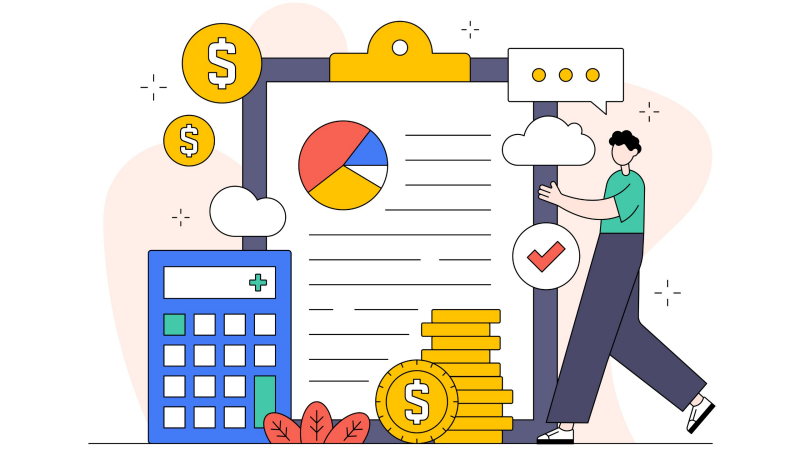How to manage debt during inflation

When inflation is on the rise these rising costs can impact your ability to make payments on time or meet your financial goals. Whether you're already working on repaying debts or finding yourself in more debt as a result of higher costs, inflation can affect your ability to manage your debt and impact your overall financial wellness.
You're not alone — the average American is suffering from an average balance of $5,747 in credit card debt according to a report by TransUnion® in the third quarter 2022. As a result, fewer and fewer people are able to pay off their credit card balances each month.
Inflation has a ripple effect — your purchasing power dwindles and your income may feel like it covers less than it used to. As a result, you may be using your credit card more frequently to pay for everyday goods and services, only to find you can't make your minimum monthly payments which could cause you to fall into further debt.
Not only that, but inflation can impact your debts over time due to the fact that it can affect annual percentage rates (APRs). For example, being $2,000 in debt in the past may have come with a lower APR. While down from it's 2022 high, inflation remains a stubborn presence in the U.S. economy, affecting APRs and making paying back your debts even more difficult. For example, a minimum monthly payment just 2-3 years ago would have been significantly easier on your wallet than today's payments.
For example, the average APR for a 30-year mortgage was at 2.89% inthe summer 2021 — today, the national mortgage rate is up to 6.83%.
With all the consequential impacts of inflation, it can be a real struggle to keep up with your finances. With a little patience, understanding and diligence, you may be able to recover from your debts and find ways to balance out your personal finances.
Tips on handling your debt
If you're finding yourself struggling to make ends meet as a result of inflation, remember—you're not alone. Many people struggle with the compounding affects of high costs and it can make paying off debt that much harder to do.
That's where debt management may come in to play. Below are some tips on how you can handle your debt and possibly recover from the effects of inflation.
Tip 1. Get assistance from a credit counselor
Trying to balance out all your debts can be daunting, but you don't have to do it alone. With the help of a credit counselor, you can gain advice, tips and action plans to help manage your finances and set yourself up for a successful financial future.
Tip 2. Enroll in Chase Credit Journey®
Monitoring your credit report with free online tools like Chase's credit monitoring services through Chase Credit Journey can help keep you aware of activity affecting your credit score. You can also set up a score goal where you can receive a personalized action plan powered by Experian™.
Tip 3. Set up a debt management plan (DMP)
You can either create your DMP on your own or through the help of a debt management company or counseling service, such as the National Foundation for Credit Counseling. DMPs involve potentially negotiating monthly payments and waving fees, if possible, in attempt to get a lower interest rate. If you decide to use a third-party service, be sure to do some thorough research to make sure the company is reputable and trustworthy.
Tip 4. Adjust your budget and add income
As you find yourself having to spend more due to rising costs and APRs, what are some ways you can cut out unnecessary expenditures and save more to help pay off your debts? Are you able to take on a side gig or work extra hours to supplement your income? Even small adjustments — such as meeting with friends at home rather than going out — can make a big impact over time.
What debt should you focus on?
As you're sorting through your remaining debts and trying to figure out where to start, you might be wondering — which debt is most important to pay off first?
While it's important to be able to make regular payments to all your debts, you may want to focus on those that are generating the heaviest financial burden. This includes credit card debts with high APRs. As you continue to acquire debt on these cards, you'll have to pay back even more in interest. The sooner you can pay off your credit card debt, the less you'll have to pay back in interest over time.
Tips for paying off your debts
As you can see, it's important to tackle your debts when you can to avoid future costs. Below are a few ways to address these debts.
1. Parse out your payments
One way to help pay off your debts is by slowly incorporating more money towards your balances with each monthly payment. For example, if you have a high APR credit card, make sure you meet the monthly minimum payment, plus extra (or whatever you can afford) towards the total balance. These incremental changes can help alleviate the impact of an escalating APR.
2. Consider your credit utilization ratio
You may also want to consider which of your credit cards has a higher credit utilization rate. By paying off the these debts and lowering your credit utilization, you may be able to help improve your credit score.
3. Adjust or refinance your current contract
For other (but still important) debts, you may be able to consider alternative approaches. For example, you may be able to refinance your mortgage, which may result in lowering your monthly payments. Working with your lender, you may be able to adjust your current plan so that you can pay off other, more urgent debts.
Feeling the stress of inflation
As you begin to take a look at how you can manage your debts, it could start to feel like you're carrying around an untenable financial burden. Managing money, making ends meet and trying to still live a fun and fulfilling life can be difficult to navigate — but it's not impossible. You are capable and strong enough to overcome and alleviate these burdens by making small, important changes over time that yield real progress when it comes to tackling stubborn debt.
Don't forget — continue to prioritize your mental wellness and overall health. Just because you're in debt doesn't mean you should give up taking care of yourself, such as eating nutritious meals, exercising daily, going to therapy or participating in social activities you enjoy. While these things may cost money, they can be important to your mental health and well-being. And not all self-care has to be expensive — taking relaxing walks outside, playing with the family pet and getting regular sleep are cost-free ways to help counteract the stress of balancing debts.
Monitor your spending habits, too. If you find that you shop to help alleviate your stress, try to consciously recognize these patterns so you can make adjustments and find healthier coping strategies, such as playing music or exercising, which don't have to cost you and put you into an even deeper cycle of debt.
In conclusion
Remember — you're not alone. With the average American carrying around thousands of dollars in debt, you can take heart in the fact that you are not alone in this. Having significant debt or a poor credit score due to an inability to make monthly payments does not determine your value as a human. Rather, learning to balance and take small, progressive steps towards a more stable financial future can be a healthy approach to managing your debts.



